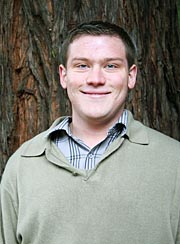By Matthew Palm
From the vantage point of a television viewer or newspaper reader, the events surrounding the UC Regents' vote to raise fees for undergraduates 32 percent must appear to be vivid allusions to the student protests of the 1960s. In fact, they are just the opposite.
The UC students of today struggle not against "the machine" as Mario Savio termed it; rather, we lobby and demonstrate so that we can stay at the university, so that our younger siblings will have some affordable college prospects left by the end of this recession.
How did we get to this point, where students feel compelled to hold sit-ins outside of class so that they can afford to still sit in class?
Missing from much of the commentary surrounding the recent fee hike vote is acknowledgment of the fact that every Regent save the Student Regent voted for the fee hikes. Even Eddie Island, often praised for his concern for students, voted for the first time as Regent in favor of a fee hike.
Why would Regents sympathetic to students and parents vote for one of the largest fee hikes in UC history? The answer is actually very simple: Funding from the State of California has declined from $15,860 per student in 1990 to just $9,560 per student in 2008 (dollars adjusted for inflation). As a direct result of this, undergraduate student fees more than doubled from 2001 to 2009, forcing my generation of Californians to pay more for school than any class before us. Each new entering class seems to face new challenges as each year we are burdened with higher costs.
How do we deal with educational costs deemed inconceivable a generation ago? Many students, like me, work more than 20 hours a week while studying as full time students. In 2005 and 2006 (when fees were considerably lower than they are now), 12 percent of undergraduate students reported working more than 20 hours a week. According the university, 51 percent of students graduated in debt during the 2006-07 school year, with the average debt burden being just under $15,000.
When California had a booming economy, graduates could more easily handle this burden. Today we are graduating into a state with a 12.5 percent unemployment rate and a much larger underemployment rate. This is why so many of my peers burst into tears in front of television news cameras at the Regents meeting in November at UCLA, begging the board not to strain us or our families with any more debt.
As a senior looking back on my four years here, I am genuinely questioning how someone could carry so much stress, work so much, and still successfully manage to delve as deeply into our wonderful curriculum as our professors would like.
We want to be here, we want to learn, and we want to get an education and make a meaningful impact in the world. But constant financial strain coupled with bleak job prospects make our desires that much harder to attain. As my mother tells me on almost a weekly basis now, "Matt--don't forget, there are only 24 hours in a day."
Unfortunately, decades of disinvestment from higher education by the state leave my peers and I fending for ourselves while at the same time the state continues to funnel tax dollars into expanding prisons. If the saying that public budgets reflect public values holds water, then right now I must question if California's government is expecting my little brother to end up in prison instead of college. This may sound inflammatory, but right now prison funding is a greater portion of our state budget than funding for all three segments of public higher education combined. Again, these misbalanced priorities in Sacramento leave California students drowning in debt.
Every dollar invested in the UC is said to yield three dollars for the state. We are an economic machine and a long-term source of prosperity for California. Can we say the same about prisons?
Please take a minute to contact your state representatives and strongly encourage them to make public higher education a real priority again.
Matthew Palm in a fourth-year history major at Kresge College and commissioner of academic affairs for the UCSC Student Union Assembly.



